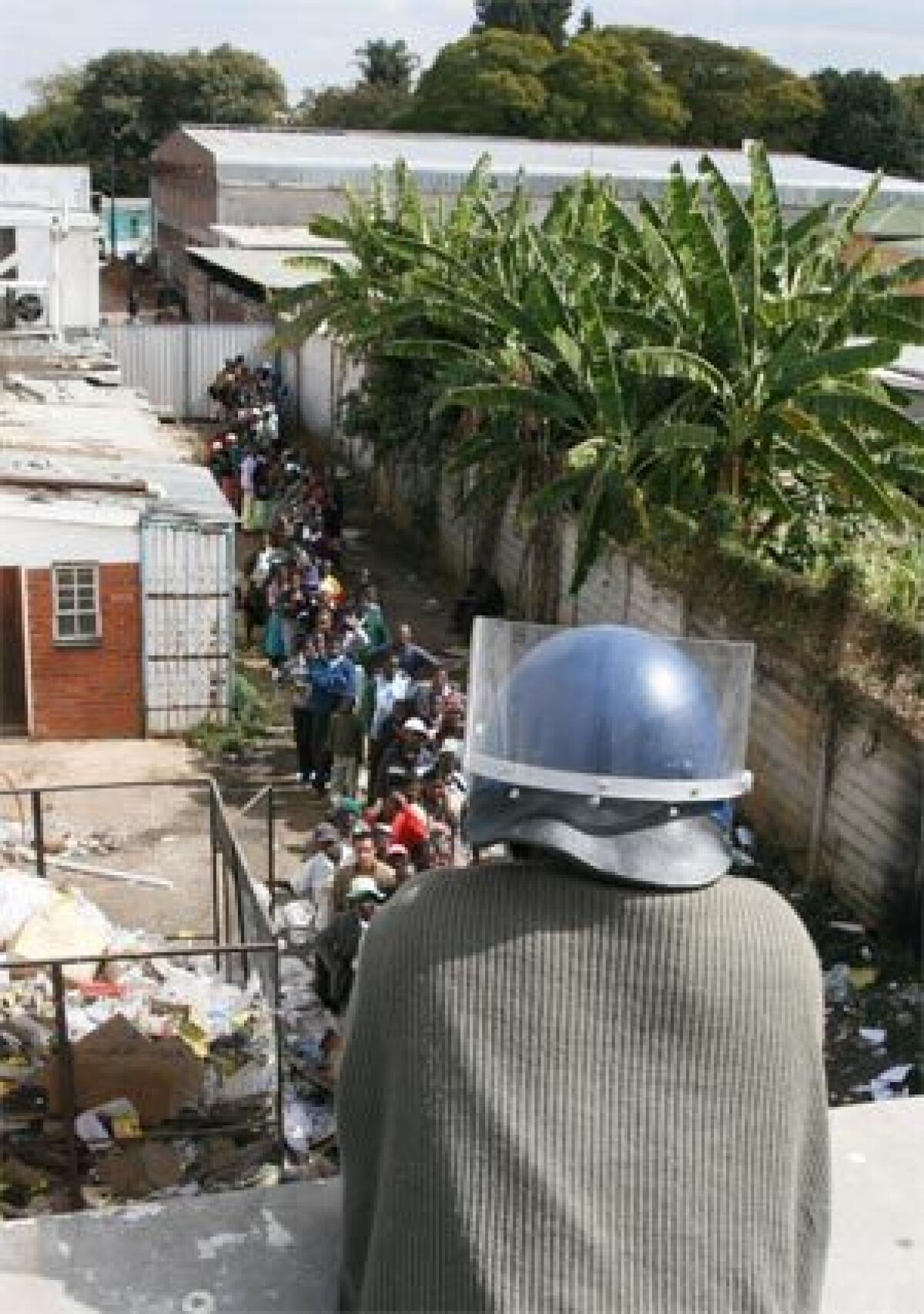Queuing for crumbs in a Zimbabwe bread line

We have been waiting for bread for nearly two hours in a rubbish-strewn lane behind a supermarket. It is midmorning, the sun already blazing down on the 50 or so people in line, when three policemen stroll to the front.
A low rumble of discontent rolls along the line, like thunder.
Then a stranger named David Kaodza materializes behind me, out of nowhere. “I was right behind you, remember? You saw me before.” He has a ready smile and the ingratiating patter of someone jumping the queue.
In Zimbabwe, where hyperinflation has reached 7,900% and people have used up their entire savings just buying food, life has been reduced to this: the queue. Go to any Zimbabwean town these days and you’ll find lines everywhere, like an invasion of giant pythons slithering into every supermarket door.
Kaodza, a hustler in a country where the flour has all but run out and bread has become a luxury, gives a quick tutorial on how to get ahead in a queue. You don’t just line up and wait to buy. There is an unspoken etiquette, with subtle rules. Only those in a police or army uniform get to ignore the queue entirely.
For people such as Kaodza, queuing is no mere dull necessity; it’s become a business. They are master queue tacticians, managing to be in line in three or four places. They reserve themselves a place at the top of the queue, scamper to the end and reserve themselves a place there by making a deal with the last person to let them back into line later. They wait for the queue to build up a little more and scurry to grab another place at the end.
According to local etiquette, you can leave the line, but never for long. To rejoin, you need the recognition of the person you made an agreement with. But if you neglect to pay the guard in charge of the queue, you still won’t be able to creep back to your place, Kaodza says.
“It’s every man for himself. Sometimes you say you were in the queue and you just came back and someone says, ‘I didn’t see you.’ And you’re just canceled from the queue.”
Kaodza always carries a few old newspapers to read. His mantra: Trust no one. And develop a thick skin. He is used to insults.
“There are people in the queue who hate me because I manage to get four twists [loaves] and they can’t even manage to get one twist. It’s do or die. One has to win. The other has to lose.”
Misleading newcomers about the length of the wait, and even what the queue is for, is a common ploy to minimize the competition, Kaodza says.
Not everyone in line is as lucky or pushy as he is. Many are hungry, tired, desperate to get food for their family, and spend all their days waiting.
“That woman behind you, she came a long way,” says Kaodza, who knows everyone in the line. “She was dirty, that woman, because where she comes from there is no electricity and water’s a problem.
“She wakes up very early, and by the time she’s walked to town she is all dusty.”
He says some people collapse in the queue but others are afraid to help, for fear of losing their place.
“It’s better not to be a witness for anyone who’s sick in line, because if they die, the police will take you away to the next of kin and you will have to explain what happened,” Kaodza says in a matter-of-fact tone.
As we wait, several women wearing the uniforms of city street cleaners saunter by, loudly proclaiming that they should join the front of the line because they have to work all day. At first people guffaw at their clumsy attempts to queue-hop. But when the smell of freshly baked bread begins to waft out the doorway, there are shouts of indignation. The women manage to squeeze inside the door just as the first loaves are handed over.
The first batch runs out. The doors close. The line grows restless.
“People are prepared to fight in the queue,” Kaodza says.
The security guard at the door starts throwing his weight around, threatening to beat some people who are trying to rejoin the queue, while apparently failing to notice others sneaking through.
As I huddle close to the wall trying to look unobtrusive, the guard suddenly points his finger at me. All eyes swivel in my direction.
“Look at that white woman there -- she’s queuing up. And you’re asking me to let you go to the front!” he shouts. White people, it seems, rarely queue.
Behind me, Kaodza laughs. “Those people obviously didn’t pay the guard,” he whispers.
Kaodza usually gets six to eight twist loaves. He cuts each in half and adds a smudge of margarine and a couple of slivers of sausage and sells them. He makes up to 3 million Zimbabwean dollars, or $6, a day on sandwiches, and in five days earns more than most teachers did before their recent pay raise.
In another queue at another supermarket, an unlikely friendship was born. The two men were essentially rivals for bread. One of them, Shane Johnson, 35, hoped to get a few rolls for his wife and two children; the other was a profiteer, determined to get hundreds to resell at an inflated price.
They saw each other most days in the bread queue. A few weeks back they found themselves next to each other. They struck up a cautious conversation.
“You have to be so careful who you talk to. You should have the freedom even in a queue to say what you are thinking, but you can’t because you’re too afraid,” Johnson says, fearful that the queues are full of “dodgy characters” and police informants.
But long hours slowly wore down their reserve.
“Eventually, we started becoming very close,” says Johnson’s friend, a 27-year-old who gives his name only as Nicholas, afraid of repercussions from the authorities if his full name is published. “If he has to go somewhere, I’ll go and wait in the queue for him. Or if I can’t wait in the queue, he’ll wait for me. We look out for each other.”
The main bread factory ran out of flour weeks ago: Now the only bread is found at small bakeries in supermarkets.
As shortages bite deeper, the Brussels-based International Crisis Group warned in a September report that Zimbabwe was “closer than ever to complete collapse.”
President Robert Mugabe, who has ruled Zimbabwe since its independence from Britain in 1980, blames the West for the catastrophe. But each measure adopted by the ruling ZANU-PF party seems to have made things worse.
By printing money, it triggered hyperinflation. Its remedy was to set prices in Operation Dzikisa Mutengo (Operation Reduce Prices) in late June, which emptied the supermarket shelves of basic goods and ran some small businesses into the ground.
“We all line up for bread, for milk, meat, for cooking oil and sugar,” Johnson says. “You talk to the guys in the queue, and they all feel the same way: There’s nothing you can do.”
People also queue for hours for cornmeal, a staple known as “mealie meal,” or for matches, candles and even plastic buckets to catch rainwater.
Johnson, softly spoken, thoughtful and polite, is not a hustler. “I hate queuing. I absolutely hate it, because I don’t like to be pushed around,” he says.
But Nicholas has undergone a transformation, thanks to the bizarre economic conditions. In late August he quit his job as a truck driver, giving up a wage that was being gobbled up by inflation, and discovered he had an unplumbed talent for trading.
In August, his wage was $3.20. Now he makes about $70 a week selling drinks. Selling rolls is a sideline that earns him $5 a day. For comparison, teachers earned as little as $4.80 a month until the government raised their wages last month to a minimum of $28.
The people who struggle most are workers who don’t want to give up the security of even a meager salary for the uncertainties of profiteering.
“There are a lot of people who don’t know how to do it,” Nicholas says. “They have it worse because they don’t know how to go out and buy and sell. They wake up a bit late. They don’t know where to go and who to see. They don’t know how to talk to people.”
Johnson’s path could not be more different from his friend’s. He had owned a thriving electronics repair business since 1995. But rents kept going up and customers evaporated. In a decision he likened to a painful divorce, he closed down in March.
Between trips to queue up, he does a few freelance repairs for old clients, while his wife works.
When he is in line, he frets about his children. There is his little girl: He always dashes out of the line to pick her up from nursery school. He knows he can’t afford a decent school for her next year. There is his 3-year-old son, who has asthma. With hospitals unaffordable, no transportation and the family savings gone, what happens if he has an attack?
If there is one main conversation piece in the queue, it is the queues themselves. Rumors fly about how a fight broke out in one somewhere, or how a supermarket fridge or window was broken when tempers got frayed.
Then there are the inevitable stories about another, better queue nearby, for sugar or mealie meal, stories no one is sure whether to believe.
There is always wariness and distrust. Fears of “dodgy characters” and plainclothes secret police loom large, though it is impossible to know whether they are in the queue.
In Zimbabwe, people live with fear all the time. Even so, most days the conversation in the queue eventually drifts to politics. People blame Mugabe, whom they call “our father” or madala (old man) or “Bob,” for the chaos.
“They’re too scared to talk about him as the president. Most people wish that he was dead,” Nicholas says.
“They say he’s killed our country,” says Charles Moyo, 45, a night-shift worker who queues every day for bread for his four children.
Although people often share their anger, most find it difficult to break through the layer of distrust. There are passing friendships in the queues, but most don’t exist outside the line.
Johnson and Nicholas drop by each other’s house and socialize whenever they can. But just as the friendship was born out of the economic crisis, it might die that way too.
Although Nicholas is something of a success in today’s Zimbabwe, earning enough to save a little and even lend cash to friends, Johnson realizes that he will never have the aggressive edge that makes his friend such a talented trader. After losing his business, he knows he is not made for Zimbabwe’s dog-eat-dog economy.
“I’ll be honest with you, it’s not for me,” he says. “To buy and sell? I don’t do that. I prefer to work for a living.”
Ten years ago, he considered leaving for a job possibility in another country, but decided against it. “You say to yourself, maybe it will get better. It just gets worse and worse and worse.” Now, within the month, he plans to seek a better life in South Africa or Britain.
“If there was some sort of hope, I’d stay,” he says with a resigned smile.
The low mutter of gossip is interrupted as trucks chug along the supermarket lane, emitting foul black fumes into our faces, the wheels a foot from our toes.
Then there’s a sudden surge forward, a whiff of exhilaration. Finally, I shuffle through the back door of the bakery with the crowd and exchange my 80,000 Zimbabwean dollars -- about 16 cents -- for two small twist loaves, still hot when they are placed in my hands.
As I leave the bakery, I find another queue inside the supermarket: the fast queue, where police and friends of the supermarket manager get their bread.
The smell of baked bread is intoxicating.
People carry their loaves carefully, as though holding a small and fragile creature. They walk out with smiles of victory.
More to Read
Sign up for Essential California
The most important California stories and recommendations in your inbox every morning.
You may occasionally receive promotional content from the Los Angeles Times.










